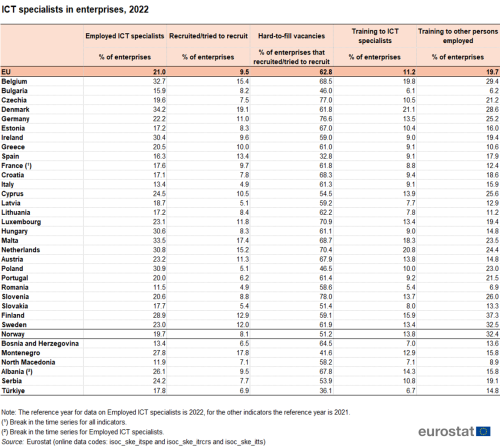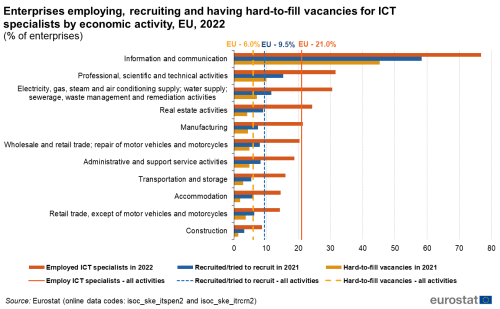Employment and recruitment of ICT specialists
21.0 % of EU enterprises employed ICT specialists in 2022
In 2022, 21.0 % of EU enterprises employed ICT specialists. Among the EU Member States, Denmark (34.2 %), Malta (33.5 %) and Belgium (32.7 %) presented the highest proportion of enterprises employing ICT specialists. Romania, with 11.5 %, presented the lowest ratio of enterprises employing ICT specialists in 2022 (see Table 1).
The information and communication sector had, with 76.8 % a high proportion of enterprises employing ICT specialists in 2022. Apart from the enterprises in information and communication activities, the highest percentages of enterprises employing ICT specialists were observed in ‘professional, scientific and technical activities’ sector (31.6 %), ‘electricity, gas, steam, air conditioning and water supply’ sector (30.5 %) and ‘real estate’ sector (24.3 %). With 8.7 %, the construction sector presented the lowest ratio of enterprises employing ICT specialists in 2022 in the EU, (see Figure 1).
The percentage of large enterprises employing ICT specialists (77.6 %) was in 2022 more than 5 times higher than the ratio of small sized enterprises employing ICT specialists (15.1 %) (see Figure 2).
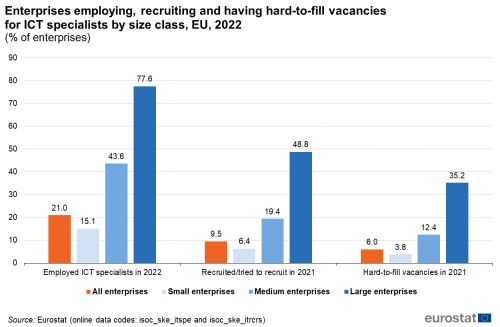
(% of enterprises)
Source: Eurostat (isoc_ske_itspe) and (isoc_ske_itrcrs)
Recruitment and difficulties reported in recruiting ICT specialists
In 2022, 9.5 % of EU enterprises reported that, during 2021, they recruited or tried to recruit ICT specialists and 62.8 % of these enterprises had difficulties in filling those vacancies. The share of enterprises recruiting or trying to recruit ICT specialists was much higher in information and communication activities (58.3 %) than in the rest of the economy (Figure 1). The ratio was substantially higher among large enterprises – 48.8 % recruited or tried to recruit ICT specialists in 2021, compared with 6.4 % for small enterprises (Figure 2). Among the EU Member States, the proportion of enterprises that recruited or tried to recruit ICT specialists in 2021 ranged from 4.9 % in both Romania and Italy to 19.1 % in Denmark (see Table 1).
Among the enterprises that recruited or tried to recruit ICT specialists, 62.8 % reported difficulties in filling vacancies in 2021. In Slovenia (78.0 %), Czechia (77.0 %) and Germany (76.6 %) more than 3 out to 4 enterprises that recruited or tried to recruit ICT specialists in 2021, reported difficulties in filling those vacancies. In Luxembourg and in the Netherlands the share was also higher than 70 % (70.9 % and respectively 70.4 %). With 32.8 %, the lowest ratio in 2021 of enterprises with difficulties in recruiting ICT specialists was observed in Spain (see Figure 3).
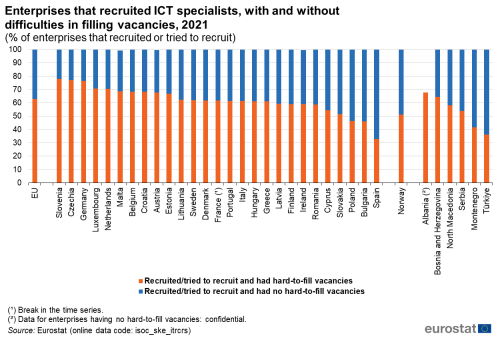
(% of enterprises that recruited or tried to recruit)
Source: Eurostat (isoc_ske_itrcrs)
With 51.3 % the lack of applications was the difficulty for filling ICT specialists’ positions most often reported by enterprises in 2021. Lack of relevant qualifications, high salary expectations and lack of experience were almost equally significant barriers faced by enterprises when filling ICT specialists vacancies and reported by only a slightly lower share of enterprises. In 2021, enterprises that recruited or tried to recruit ICT specialists, faced the same difficulties regardless of their enterprise size (see Figure 4).
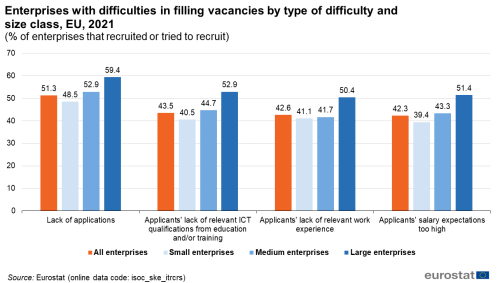
(% of enterprises that recruited or tried to recruit)
Source: Eurostat (isoc_ske_itrcrs)
ICT training provided to personnel
One out of five enterprises provided ICT training to persons employed
Training is crucial to enhance or equip employees with new ICT skills. ICT training is relevant for all staff, particularly for ICT specialists, but also for other persons employed, i.e. non-ICT specialists. As shown in Figure 5, 22.4 % of EU enterprises provided training to all their staff in order to enhance their ICT related skills in 2021. The ratio reached 69.5 % among large enterprises, which was almost four times higher than for small enterprises (17.7 %).

(% of enterprises)
Source: Eurostat (isoc_ske_itts)alt=A vertical bar chart with four bars showing Enterprises that provided ICT related training to their persons employed by size class in the EU in 2021. The bars show small enterprises, medium, enterprises, large enterprises and all enterprises.
In 2021, 11.2 % of EU enterprises provided training to ICT specialists to enhance their ICT skills. Among large enterprises, the share of enterprises that provided ICT training to ICT specialists reached 57.6 %, while 7.1 % of small enterprises provided ICT related training to their ICT specialists (see Figure 5).
The proportion of enterprises providing ICT training to their ICT specialists ranged from 3.6 % of enterprises in construction to 54.7 % in the sector of information and communication. In 2021, 19.7 % of EU enterprises also provided ICT training to ‘other persons employed’. In all the economic sectors, except for the sector of information and communication, the share of enterprises providing ICT training to non-specialist staff was higher than the ratio of enterprises providing training to ICT specialists (see Figure 6).
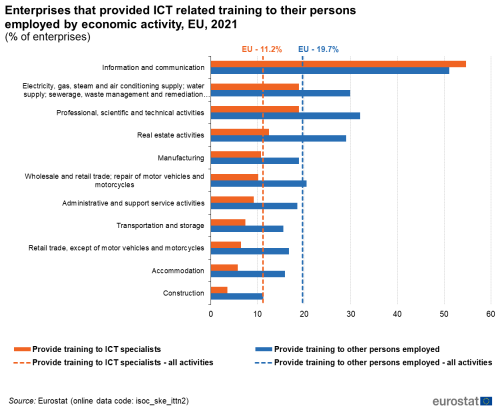
(% of enterprises)
Source: Eurostat (isoc_ske_ittn2)
ICT functions performed in enterprises
In 2021 72.5 % of EU enterprises outsourced their ICT functions
In the 2022 survey on ICT usage and e-commerce in enterprises, respondents were asked to report on who mainly performed ICT functions for the enterprise in 2021, own employees or external suppliers. In 2021, in 72.5 % of EU enterprises external suppliers performed the ICT functions. In all but one EU Member States the majority of enterprises outsourced their ICT functions, with the highest shares in Belgium (82.8 %), Denmark (81.7 %) and Malta (81.1 %). In Latvia and Bulgaria the ratio was the lowest with 54.8 % and 51.0 % of enterprises respectively outsourcing their ICT functions. In 2021, in 40.8 % of EU enterprises the ICT functions were performed by own employees. Among the Member States, the ratio of enterprises fulfilling their ICT functions internally ranged from 21.7 % in Italy, to 69.0 % for Finland. Latvia was the only EU Member State where a higher share of enterprises relied on own employees to perform the ICT functions than the share of enterprises outsourcing the ICT functions (Figure 7).

(% of enterprises)
Source: Eurostat (isoc_ske_fct)
The share of enterprises outsourcing their ICT functions reached 83.1 % among large enterprises, compared with 70.9 % for small enterprises in 2021. On the other hand, the disparities between the enterprises of different size classes were much higher when comparing the share of enterprises where own employees performed the ICT functions. While in 86.4 % of large enterprises the ICT functions were performed by own employees, this was the case only in 35.8 % of small enterprises (see Figure 8).
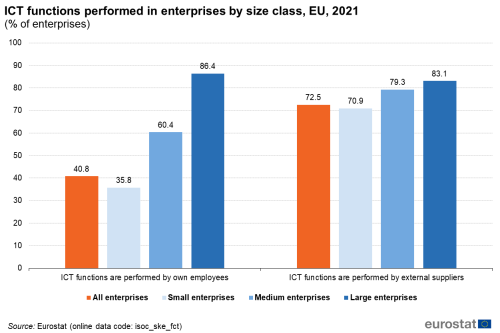
(% of enterprises)
Source: Eurostat (isoc_ske_fct)
Source data for tables and graphs
Data sources
Source: Data presented in this article are based on the results of the 2022 Community survey on ‘ICT usage and e-commerce in enterprises’. Statistics were obtained from surveys in enterprises conducted by National Statistical Authorities in the first months of 2022.
Data in the database are organised according to the survey year. Data on enterprises that employed ICT specialists refer to calendar year 2022. However, data on enterprises that recruited or tried to recruit ICT specialists, had hard-to-fill vacancies and provided training refer to the calendar year 2021.
Data presented in this article may differ from the data in the database on account of updates made after the data extractions used for this article. Data in tables shown as ‘:’ refer to data that are unavailable, unreliable, confidential or not applicable. Unreliable data are included in the calculation of European aggregates.
Sample: In 2022, some 150 400 enterprises, with 10 or more employees or self-employed persons, out of 1.47 million in EU were surveyed. Out of these 1.47 million enterprises, approximately 83 % were small enterprises (with 10-49 employees or self-employed persons), 14 % medium (50-249 employees) and 3 % large enterprises (250 or more employees).
Main concepts: The observation statistical unit is the enterprise, as defined in the Regulation (EEC) No 696/1993 of 15 March 1993. The survey covered enterprises with at least 10 employees or self-employed persons. Economic activities correspond to the classification NACE Revision 2. The sectors covered are manufacturing, electricity, gas and steam, water supply, construction, wholesale and retail trades, repair of motor vehicles and motorcycles, transportation and storage, accommodation and food service activities, information and communication, real estate, professional, scientific and technical activities, administrative and support activities and repair of computers and communication equipment.
Context
Competitiveness, innovation and job creation in European industry are being increasingly driven by the use of new information and communication technologies. This needs to be backed up by a workforce that has the knowledge and skills to use these new technologies efficiently. Given the transversal role of digital competences in the economy, a shortage of ICT specialists and workers with advanced ICT skills could hamper Europe’s growth objectives. The European Commission is working on a number of initiatives to boost ICT skills in the workforce. This is part of the Commission’s broader agenda for better skills upgrading, anticipating skills demand and matching skills supply to demand.
The Commission is launching the Digital Skills and Jobs Coalition to develop a large digital talent pool and ensure that individuals and the labour force in Europe are equipped with adequate digital skills.

